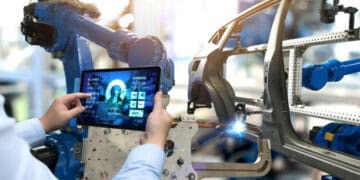Cimcorp, recognized for its expertise in robotic handling solutions, is advancing sustainability within the fresh food and tire sectors through the application of automation technologies. The company’s automated material handling systems, once integrated into tire manufacturing plants and grocery distribution centers, are reported to significantly enhance energy efficiency, reduce waste, and foster more sustainable supply chain practices.
Adam Gurga, Cimcorp’s National Manager of Grocery and Retail Partnerships, emphasizes the growing significance of sustainability in the company’s main industries. He notes the increasing demands from consumers, investors, and regulatory bodies for reduced consumption of natural resources and minimized waste throughout the supply chain. Gurga suggests that automation is among the most effective strategies for achieving eco-friendlier production, warehousing, and distribution operations.
Cimcorp’s robotics and software are engineered with an emphasis on sustainability, offering several key benefits:
Energy Efficiency: The company’s gantry robots, constructed from aluminum for a balance of lightness and strength, are designed for low energy consumption. These robots can transport multiple items simultaneously, enhancing the efficiency of operations within distribution centers. Additionally, they incorporate regenerative braking systems that convert braking energy back into electrical power, contributing to their energy efficiency.
Optimized Logistics: The Warehouse Control System (WCS) developed by Cimcorp aims to optimize the loading of delivery vehicles, ensuring more efficient use of truck space and potentially reducing the number of trucks required. This optimization is intended to result in fewer miles driven, less pollution, and a greener supply chain.
Waste Reduction: In the grocery retail sector, Cimcorp’s automation solutions are designed to streamline distribution operations, allowing for quicker movement of produce from the field to the store and reducing the risk of spoilage and waste. The company has reportedly accelerated distribution for its grocery retail customers globally, with notable examples including aiding Mercadona, Spain’s largest grocery retailer, in achieving expedited delivery times.
Sustainable Packaging: Cimcorp’s systems support the use of reusable plastic crates (RPCs), which are favored by many grocers over traditional cardboard options due to their durability and reusability, contributing to a reduction in packaging waste.
Reduced Manufacturing Scrap: In tire production, Cimcorp’s automated handling systems are credited with significantly reducing material waste by minimizing the need for intermediate storage and reducing the scrapping of materials. The WCS allows for detailed tracking and tracing of tire components, mitigating the risk of scrapping entire inventories due to process disruptions.
Gurga states that Cimcorp is committed to assisting its clients worldwide in planning and implementing automated solutions for warehousing and distribution operations, aiming to enhance efficiency while reducing environmental impacts. The move towards automation is presented as a key step for companies seeking to lessen their supply chain’s ecological footprint.
Your source for supply chain report news updates: The Supply Chain Report. For international trade insights and tools, head to ADAMftd.com.
#Cimcorp #RoboticHandling #Sustainability #Automation #EnergyEfficiency #SupplyChain #WasteReduction #GroceryRetail #TireManufacturing #LogisticsOptimization #EcoFriendly #SustainablePackaging #Innovation #RegenerativeBraking #WarehouseControl #GroceryDistribution #ManufacturingExcellence #ClientCommitment

















